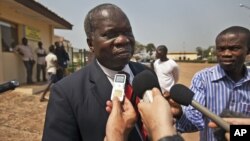BANGUI, CENTRAL AFRICAN REPUBLIC —
Negotiations are set to open this week in Gabon's capital to try to find a peaceful solution to the month-long rebellion in the Central African Republic. A rebel delegation arrived in Libreville late Monday but the plane scheduled to take government officials, opposition leaders, and civil society members to the Gabonese capital was delayed.
The government of the Central African Republic heads into talks with the Seleka rebel coalition amid renewed fears of rebel attack on the capital and deadlock over demands for President Francois Bozize to step down.
Rebels say Bozize must go. The government says that is out of the question.
The Seleka rebel coalition has seized one-third of the country since launching its offensive in the north on December 10.
Rebels are now about 85 kilometers from the capital, according to government and rebel sources Monday. Government troops have been sorely outmatched. A multi-national African force now stands between the rebels and the capital.
In late December, Bozize agreed to go to unconditional talks to form a coalition government and said he will not stand for a third term in 2016.
The head of the government delegation, minister Jean Willyboro Sako, said Monday he has hope for dialogue.
He says he hopes the president's proposed concessions will be enough because a little while back, even those were not on the agenda. He says a lot of obstacles have been cleared since the president made those spontaneous pledges, which he called demonstrations of the president's good will.
This is the third major rebellion against Bozize since he won a 2005 election. He had seized power two years earlier in a military coup.
Seleka is made up of fighters from three main rebel groups in the north who say the government didn't hold up its end of peace accords signed in 2007 and 2008.
The government's deputy negotiator, Cyriaque Gonda, recently said that officials are ready to discuss those failings, and in particular work to get a disarmament program back on track, but he told VOA this will be the rebels' "last chance" at the negotiating table.
"This is going to be the last time. We want to put away in Central African Republic the words rebellion [and] politico-military. This is a lexocology that we have discovered here. We are going to put it down at any cost. But the bottom line is to try to create cohesion," he said.
The country's political opposition - nine parties in all - will also be at the table in Libreville. They say they are united in their position but will not say whether or not they want Bozize to step down.
The head of that delegation, Nicolas Tiangaye, says they are going to talks with lots of optimism that they will bring a lasting peace to the country. He says finding the solution to this crisis will consist of more than just revisiting previous peace accords and various state institutions will also be called into question.
A key question heading into talks is whether the Seleka rebel alliance will hold, and also whether those present in Libreville will accept anything other than Bozize's departure.
Francois Nelson Djadder, coordinator of the CSPK rebel group, an affiliate of Seleka, says his group is not particpating in negotiations because Bozize's resignation is a pre-condition to talks.
Djadder says they don't trust the president and are not going to enter into a coalition government. He says they speak on behalf of the people of the country who have suffered under Bozize for the past 10 years and they are going to bring back democracy and social unity.
Djadder said Seleka fighters advanced to 12 kilometers outside the town of Damara this past week after being attacked by pro-government Chadian forces.
Damara, at just about an hour's drive from the capital, is the last strategic outpost before Bangui.
The head of the regional FOMAC force holding the line at Damara has warned rebels that to attack would be to declare war on the 10 Central African states backing the force.
President Francois Bozize was in Brazzaville Monday meeting with Republic of Congo President Denis Sassou Nguesso, who will mediate the talks in Libreville.




